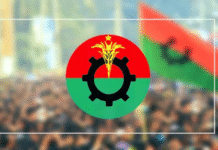Bangabandhu’s galvanising speech of March 7

It is now an admitted fact that in the treasury of the world’s great speeches, the historic March 7 speech of Bangabandhu Sheikh Mujibur Rahman occupies a special place of honour and prominence. This speech gained international recognition when UNESCO enlisted the historic speech as part of the world’s documentary heritage. It has also been included in the “Memory of the World Register”, a list of the world’s important documentary heritage maintained by UNESCO.
The book We shall fight on the beaches: The Speeches that Inspired History by Jacob F Field, which is a collection of “extracts from the most rousing and inspirational wartime speeches of the last 2500 years—Cicero to Churchill, Lincoln to Mao”, also included Bangabandhu Sheikh Mujibur Rahman’s historic March 7 speech (which effectively declared Bangladesh’s independence) as one of the most rousing and inspirational wartime speeches in the last 2,500 years.
The speech had electrifying effects. It transformed the then 75 million people into a people’s army, ready to fight till their last blood for the independence of their motherland. It proved to be momentous when the call for action came in the early hours of March 26, 1971.
Former Vice Chancellor of the University of Dhaka and Professor of Mass Communication AAMS Arefin Siddique observes, “Bangabandhu completed this timeless speech in 19 minutes by uttering between 58 and 60 words per minute. In broadcasting theory, 60 words per minute is considered to be an ideal. There were no annoying repetitions in the speech of 1,107 words. There were no unnecessary articulations—only the gist or core points. However, repetition at one or two places reinforced the inner meaning of the speech.”
“Bangabandhu started his address like this: “My dear brothers, I have come before you today with a heavy heart. All of you know and understand how hard we have tried. But it is a matter of sorrow that the streets of Dhaka, Chittagong, Khulna, Rangpur and Rajshahi have today become coloured with the blood of my brothers. Today, our people (Banglar manush) want freedom, they want to live, they want their rights.” It was a highly effective introduction to the speech, which laid the foundation for the main address and provided indications to the audience regarding what was to follow.”
An essential characteristic of a statesmanlike and authoritative speech is not only to familiarise the audience with future initiatives and work-plans, but also to motivate and inspire them to participate actively. Bangabandhu’s words were inspirational: “I call upon you to turn every home into fortresses, confront the enemy with whatever you have and close all roads for life even if I am not around to give orders.” The 75 million people of Bangladesh accepted these orders as more than mere directives. A humanitarian outlook was a key feature of Bangabandhu’s character. The March 7 speech demonstrated that his liberal humanism did not diminish even while issuing stern warnings. While standing on the crossroads of life and death of a nation, he cautioned, “We will starve them of food, we will deprive them of water.” But this was immediately followed by words of reassurance: “You are my brothers—stay in the barracks, and nobody will tell you anything. But do not attempt to shoot at my heart.” This coexistence of hard and soft attributes could always be observed in the magnanimous Bangabandhu.
Bangabandhu followed properly the rules of “put the attributes first” while making references to quotations. He made comments after mentioning the source first. For example: “Bhutto said, he would not go;” or, “Yahya Khan took over the government. He said, he would give a constitution and democracy to the country—we accepted.”
The main job of a public speech is setting an agenda, which was repeatedly done in Bangabandhu’s speech. The following part of his address shows that there was no change in his humanitarian approach even while announcing tough programmes: “I want to pronounce clearly that the courts, offices, criminal courts and educational institutions will remain closed from today, indefinitely. Other items will remain outside the purview of the strike, so that the poor don’t suffer and my people do not endure hardship. Rickshaws, horse-drawn carriages, trains and launches will run; only the Secretariat, Supreme Court, High Court, Judge Court, and semi-government offices like WAPDA shall not operate.”
When Bangabandhu said towards the end of his speech, “Set up action committees under the leadership of Awami League in all villages and townships, and remain prepared with whatever you have. Remember, since we have learnt to give blood, we shall give more of it—we shall free the people of this land by the grace of Allah”; it showed that he could keep the audience hooked with a high degree of efficiency by applying the art and techniques of communication theory.
The last sentence of Bangabandhu’s March 7 speech—”The struggle this time is for emancipation! The struggle this time is for independence!”—was effectively a declaration of independence expressed with a firm resolve, which had, in fact, defined the speech. The way he concluded the speech tallied exactly with textbook communication theory. It is said, don’t drag out your conclusion. We often use words like “in conclusion” or “we must say one thing” while concluding a speech. But Bangabandhu directly entered the “speech definition” in his historic address—through an appropriate application of communication theory, which was quite unthinkable 49 years ago.
In his address delivered on June 4 1940, British Prime Minister Winston Churchill said: “We shall fight on the beaches, we shall fight on the landing grounds, we shall fight in the fields and in the streets, we shall fight in the hills, we shall never surrender.” Here, “we shall fight” was the definition of that speech.
Although the historic March 7 speech was extempore, there were no repetitions and hesitations in framing words, as usually observed in such speeches. It was possible for Bangabandhu alone to deliver such an unostentatious, direction-giving, poetic speech without any break and without taking any help from notes, while standing in the middle of a sea of people. That is why, the international periodical Newsweek termed Bangabandhu as a “Poet of Politics” in the cover story of its April 5, 1971 issue. This speech was literally a revolution—which culminated in our Liberation War and freedom. Such spectacular application of words was truly an amazing event.
The March 7 address of 1971 was not only the greatest political speech in the Bengali language; it is one of the best in the entire world. This speech was simultaneously the declaration of our independence and the inspiration of our Liberation War.
Muhammad Nurul Huda is a former IGP.









